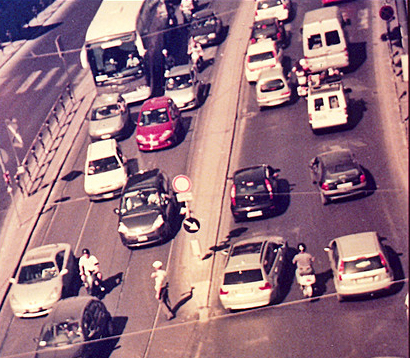 Stereotypical image of traffic in Naples, Italy.
What exactly constitutes a stereotype? Why can stereotypes work so well in humour? What aspects should we consider when talking about stereotypes and what might be the origins and functions of stereotypes? The activities in this unit address these questions. After looking at some concrete examples of national stereotypes you will try your hand at giving your own definition of the term ‘stereotype’, and reflect on stereotypes about your own culture.
Stereotypical image of traffic in Naples, Italy.
What exactly constitutes a stereotype? Why can stereotypes work so well in humour? What aspects should we consider when talking about stereotypes and what might be the origins and functions of stereotypes? The activities in this unit address these questions. After looking at some concrete examples of national stereotypes you will try your hand at giving your own definition of the term ‘stereotype’, and reflect on stereotypes about your own culture.
After delving through these articles and activities, you should be able to:
- understand the concept of stereotypes
- be aware of how stereotypes of culture and language emerge and function
This material is adapted from L161, Exploring Languages and cultures, a level 1 module that is part of the Language Studies qualification. You can view descriptions of the module and degree below.
Introduction
You might have heard a joke that starts:
In European heaven
the British are the police
the Germans are the factory workers…
Have a look at the full joke, and see if you can fill in the blanks with these nationalities: British, French, Germans, Italians
| In European heaven | In European hell |
| the British are the police | the … are the cooks |
| the Germans are the factory workers | the … are the police |
| the French are the cooks | the … are the waiters |
| the Italians are the waiters | the … are the drivers |
| the Dutch are the drivers | the Dutch are the comedians |
| the Portuguese are the comedians | the Portuguese are the factory workers |
The joke traditionally tells us that the British are the cooks, the Germans are the police, the French are the waiters, and the Italians are the drivers.
This is, of course, a tongue in cheek way to introduce the idea of stereotypes. Whether you find the joke funny or not depends on you. Some people might find it funny because it reflects generalised views that they perhaps share to some degree or, at least, are aware of. The joke taps into widely held and well-established stereotypical views of the different nations in Europe. Someone who is not familiar with European cultures and has no mental image of the different countries will not see anything funny in the joke.
Stereotypes are a part of our lives. They can refer to socio-economic group, race, gender, sexual orientation, nationality, language, accent and many other factors that distinguish people from one another. The term ‘stereotype’ was first used in its current meaning in 1922 by the political columnist and writer Walter Lippmann, who said that ‘[A stereotype is] a representation of the environment which is in lesser or greater degree made by man himself.’ Stereotypes have since been studied from different angles in disciplines such as psychology, sociology, cultural studies and linguistics.
In this collection of articles you will first look at a national stereotypes in the context of England and Germany, and then consider different definitions of stereotypes and engage with some theoretical positions and current thinking on the topic. You will also read about examples of the kinds of stereotypes about our own cultures that all of us encounter every day.
Rate and Review
Rate this activity
Review this activity
Log into OpenLearn to leave reviews and join in the conversation.
Activity reviews